
Acer tataricum subsp. ginnala (Amur Maple) North Carolina Extension
Planted 2016 This tree is known for its flashy colors. Its bright red samaras and stunning orange and red fall leaves are sure to catch anyone's attention. This maple is low maintenance and grows in a variety of soil conditions. Leaf Green, oval shaped leaves with serrated edges and a pointy tip. Fruit Bright red samaras. Flower Not showy.

Autumn branch of tatarian maple (Acer tataricum) with colorful leaves
Fruit (samaras) 4-5 cm long, the seeds are viable. Sun to part shade, more heat and drought tolerant than a Norway Maple. Hardy to USDA Zone 4b Developed by Keith Warren at J. Frank Schmidt Nursery, Boring, Oregon and introduced as Pacific Sunset™ (P.P. 7433) in 1989, it resulted from a cross of Acer truncatum x Acer platanoides .

Acer tataricum ginnala Amur maple, Amur Flame Acer Quinta dos Ouriques
Acer tataricum Common name: Tatarian Maple Tartarian Maple Pronunciation: A-ser ta-TAR-i-kum Family: Aceraceae Genus: Acer Type: Broadleaf Native to (or naturalized in) Oregon: No Broadleaf deciduous shrub/tree, 15-20 (30) ft [4,5-6 (9) m] high, similar width, often multistemmed, rounded to wide spreading.
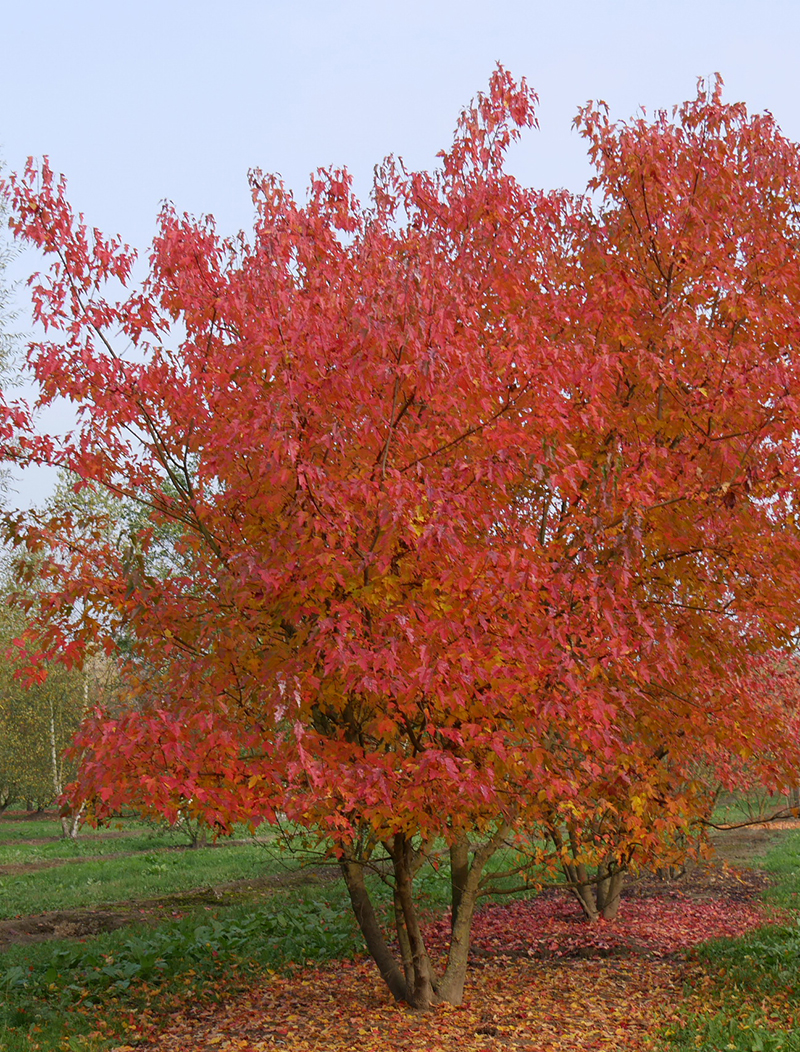
Acer tataricum subsp. ginnala Amur maple Van den Berk Nurseries
Acer tataricum 'Hot Wings' is a particularly ornamental variety, bearing masses of deep, scarlet red samaras, which adorn the tree like summer blooms. In spring, clusters of pale yellow flowers cover the tree just after it comes into leaf, and in autumn its foliage turns glowing shades of orange, red and yellow.

Acer tataricum (Amur Maple, Tatarian Maple) North Carolina Extension
A small multi-trunk tree, with and upright dense, rounded crown that matures over time to a 15 - 20' tall tree or multi-stemmed shrub. The leaves are unlobed, broad-ovate, medium green (to 4" long) with irregular doubly serrate margins found on mature trees. Leaves on young trees are often 3 lobed. Leaves turn yellow and red in the fall.

Acer tataricum (Tatarian maple) Go Botany
Acer tataricum, commonly called Tatarian maple, typically grows as a small, upright spreading tree with a dense, rounded crown or as a large multi-stemmed shrub. It matures over time to 15-20' tall. It is native to forested areas from western Asia to southeastern Europe. Unlobed, broad-ovate, medium green leaves (to 4" long) with irregular.
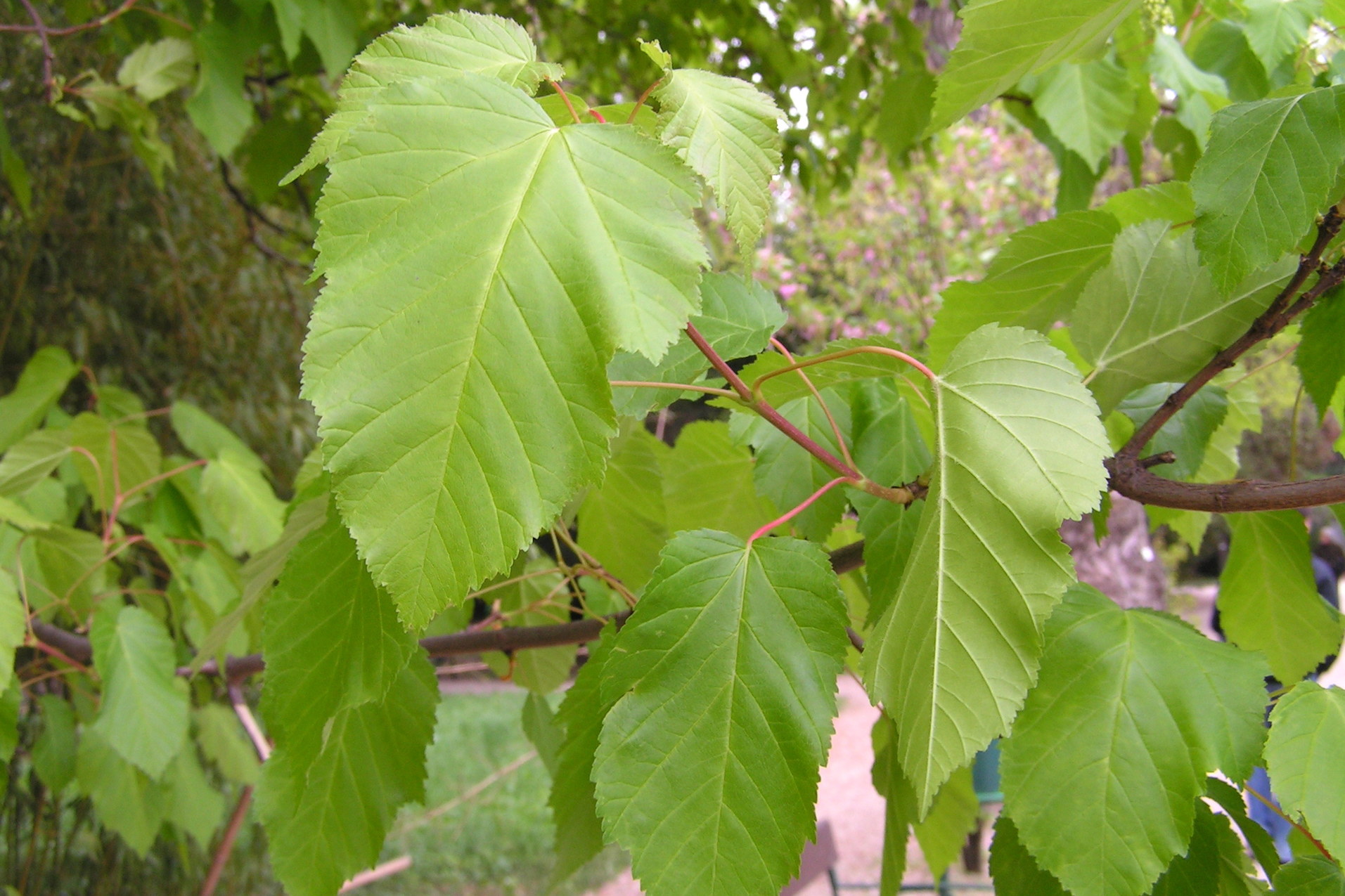
Feuerahorn Acer tataricum Beschreibung Steckbrief Systematik
Acer tataricum is a deciduous spreading shrub or small tree growing to 4-12 metres (13-39 ft) tall, with a short trunk up to 20-50 centimetres (7.9-19.7 in) diameter and slender branches. The bark is thin, pale brown, and smooth at first but becoming shallowly fissured on old plants.
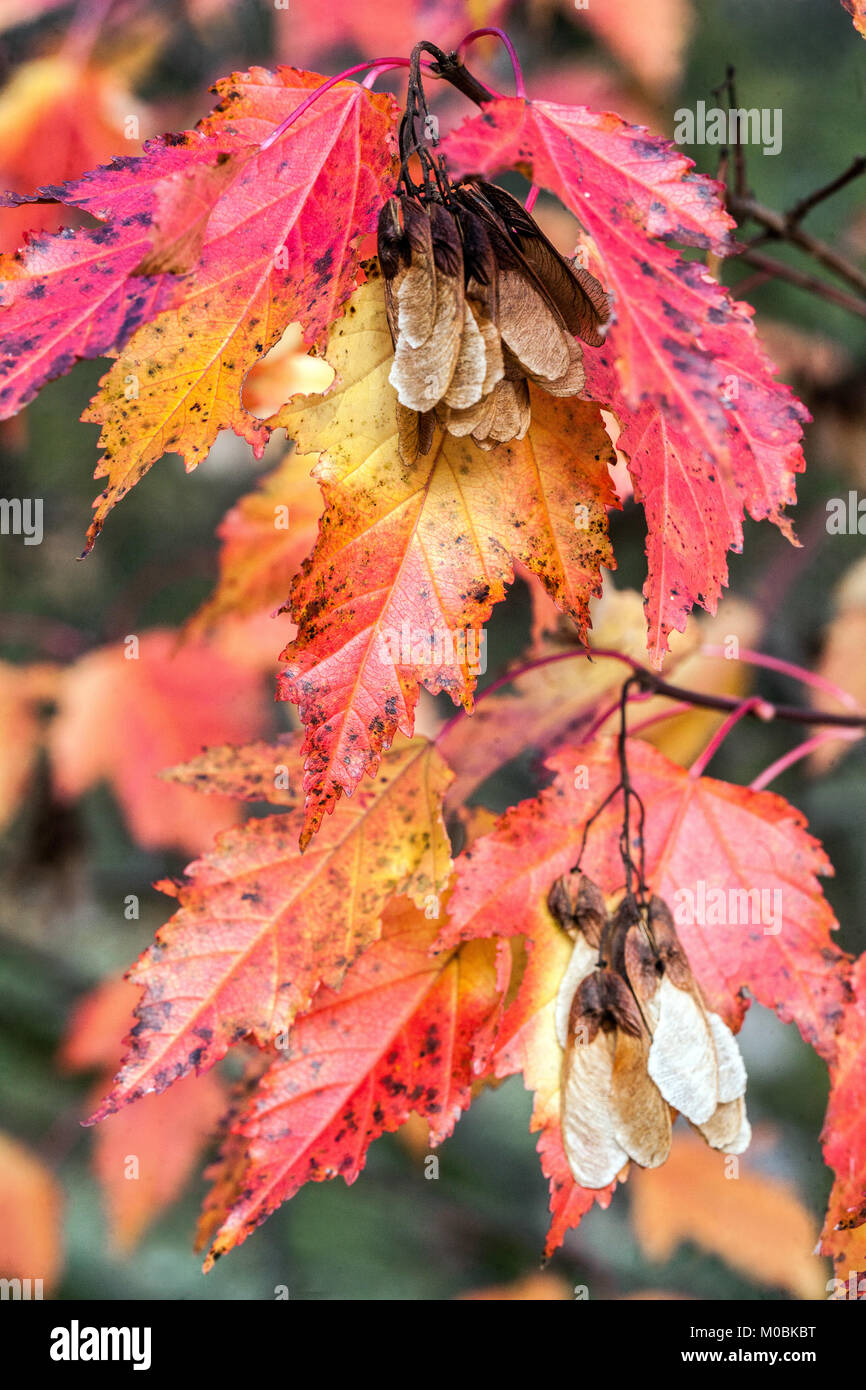
Acer tataricum Ginnala, Tatar maple or Tatarian maple, autumn leaves
Height: 15.00 to 20.00 feet Spread: 15.00 to 20.00 feet Bloom Time: April to May Bloom Description: Yellowish white Sun: Full sun to part shade Water: Medium Maintenance: Low Flower: Fragrant Leaf: Good Fall Fruit: Showy Tolerate: Drought, Clay Soil Invasive: Where is this species invasive in the US? Garden locations Culture

Stock photo Acer tataricum ginnala Tatarian maple
Acer tataricum ssp. ginnala 'Flame' Flame Amur Maple. Family: Sapindaceae (Soapberry Family) 74; Genus: Acer (Maple Boxelder) 72; Plant Type: Tree 580; Hardiness:. Leaves opposite, simple, 1.5-3" long, 3-lobed, with a long central lobe that resembles a dagger. Samara wings nearly parallel. Ecological Functions:
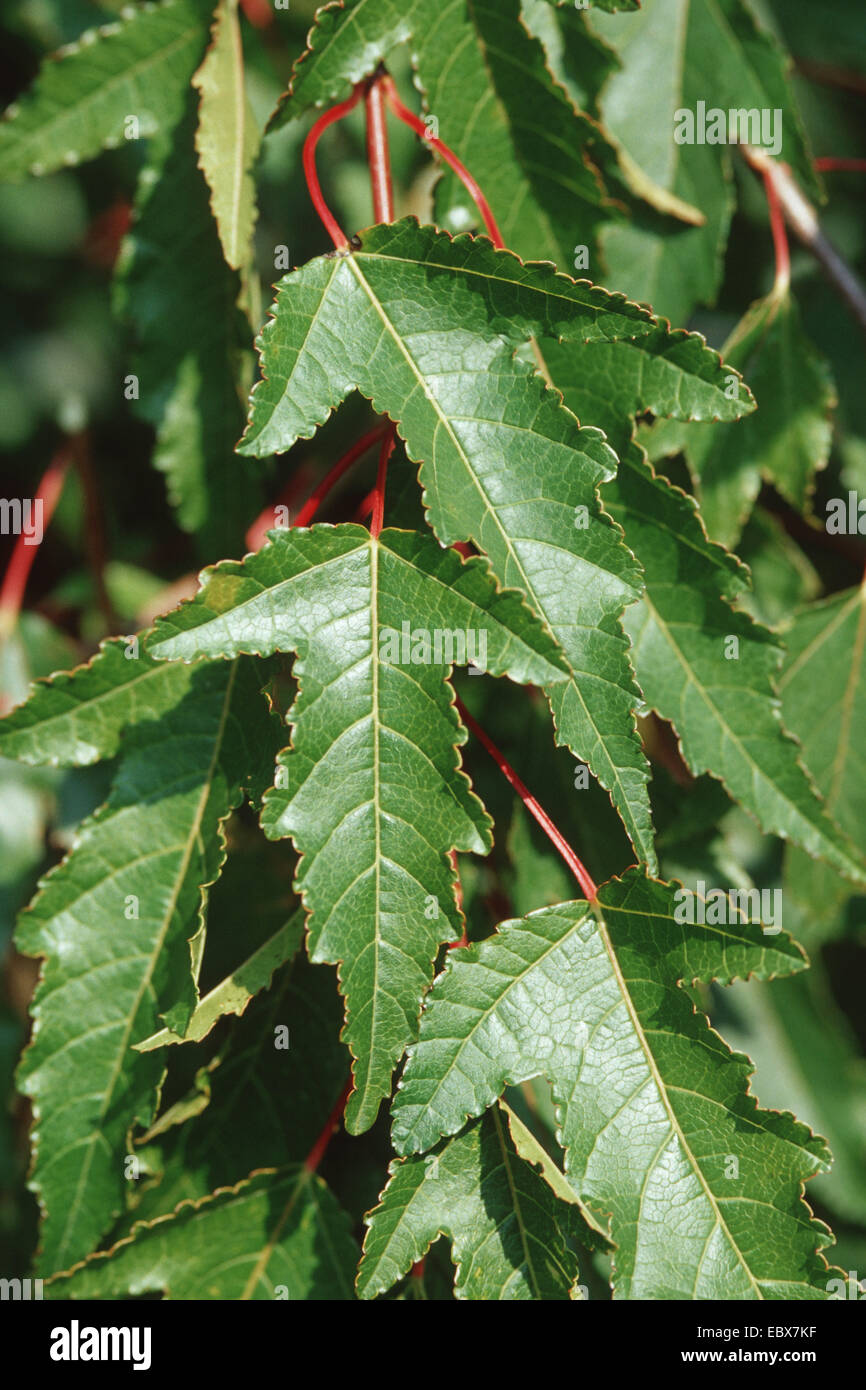
Amur maple (Acer ginnala, Acer tataricum ssp, ginnala), leaves on a
Description Tatarian maple is often confused with Amur maple. Tatarian Maple grows slightly larger and is naturally more tree-like in growth habit. Morphology: This is a broadleaf deciduous tree that can grow to 20' in height and 25' in width. It often forms a multi-stem structure.

Acer tataricum (Aceraceae) image 24834 at
Tatarian maple Aceraceae Acer tataricum L. symbol: ACTA80 Leaf: Opposite, simple, serrate to doubly serrste margin, usually unlobed or with 2 to 5 lobes, oval to deltoid in shape, 2 to 4 inches long, half as wide, green above, paler below.
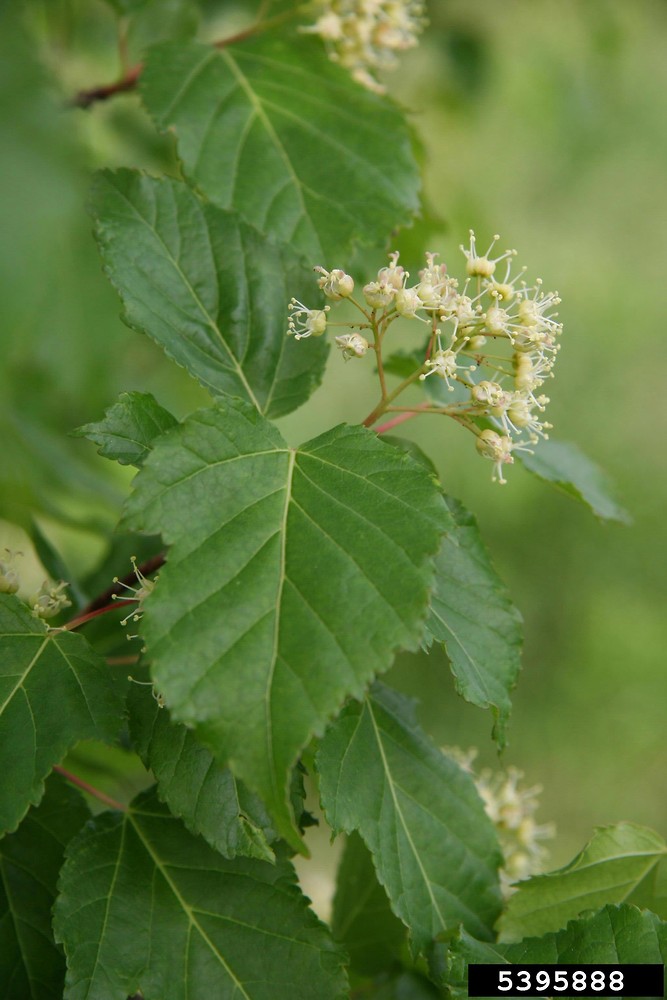
Acer tataricum (Tatarian maple) Go Botany
Sunlight: Acer tataricum prefers full sun to partial shade. Hardiness Zones: The tree is hardy in zones 3-7. Common Pests & Diseases. Acer tataricum is relatively resistant to pests and diseases, but it may be susceptible to the following: Verticillium Wilt: This fungal disease causes the leaves to wilt and die. It can be treated with a fungicide.

green leaf of Acer tataricum (Tatar Maple, Tatarian Maple, Acer
Its mature height is 15 to 20 feet tall and 15 to 20 feet wide. The leaves have a distinctive 3-lobed pattern with the central lobe being elongated. Fall color is red to orange. While it technically is hardy from zones 3-8, it will perform best in zones 3-6. Plant in full sun to light shade in a range of soil types.

Acer tataricum ginnala Amur maple, Amur Flame Acer Quinta dos Ouriques
Growth form the plant is a shrub (i.e., a woody plant with several stems growing from the base) the plant is a tree Leaf type the leaf blade is simple (i.e., lobed or unlobed but not separated into leaflets ) Leaves per node there are two leaves per node along the stem Leaf blade edges
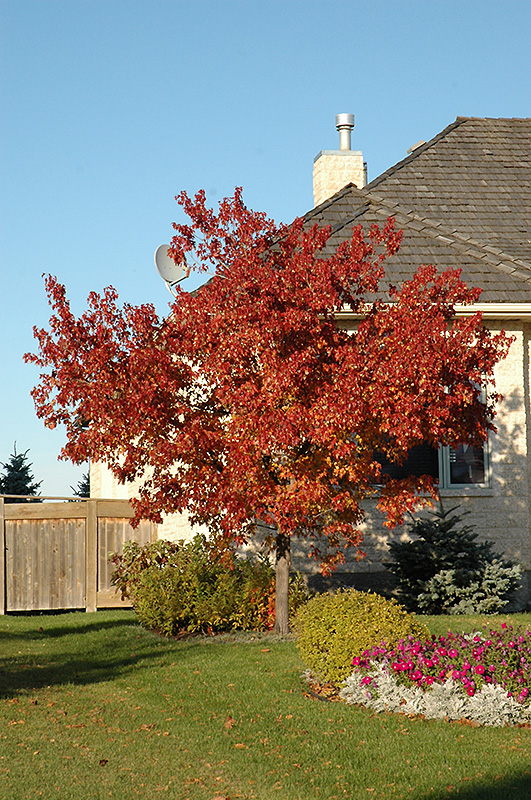
Tatarian Maple (Acer tataricum) in Columbus Dublin Delaware Grove City
A shapely Acer tataricum planted in 1965 at Bradenham Hall, Norfolk, UK; September 2014. Image Owen Johnson. A deciduous shrub of bushy habit, or a small, wide-spreading tree up to 30 ft high; branchlets glabrous. Leaves in adult trees not lobed, or occasionally slightly so; broadly ovate, rounded or slightly heart-shaped at the base, from 2 to.

Acer tataricum (Amur Maple, Tatarian Maple) North Carolina Extension
Height: 15.00 to 20.00 feet Spread: 15.00 to 20.00 feet Bloom Time: April Bloom Description: Greenish-white Sun: Full sun to part shade Water: Medium Maintenance: Low Flower: Insignificant Leaf: Good Fall Fruit: Showy Tolerate: Drought, Clay Soil Invasive: Where is this species invasive in the US? Garden locations